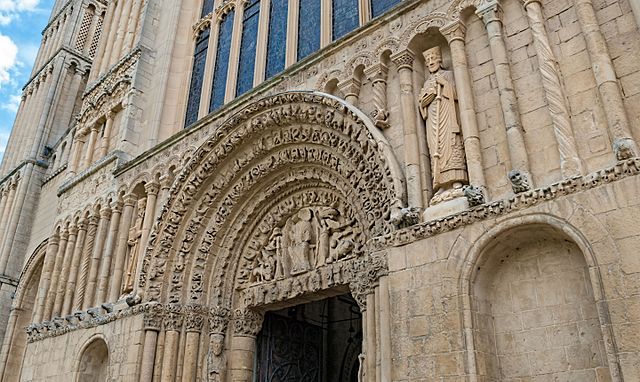Luc Plamondon’s Le Temps des cathédrales, the opening number of the 1998 musical Notre-Dame de Paris, ends on a somber note somewhat at odds with the rest of the song:
But it is doomed, the age of the cathedrals.
The horde of barbarians
Is at the city gates.
Let them enter, these pagans and these vandals.
The end of this world
Is foretold for the year two thousand
Is foretold for the year two thousand.
I won’t pretend to know exactly what Plamondon had in mind with this. That last stanza is certainly a bit haunting. But I thought of it this week because of two stories concerning Anglican cathedrals in merrie olde England.
A few weeks ago Rochester Cathedral made its medieval nave into a minigolf course as part of a “play and pray” initiative intended to draw a younger crowd to the cathedral. And just today Norwich Cathedral opened a carnival ride inside the nave of the cathedral, which they laughably claim is not a gimmick. All in the name of attracting people. Attracting people is essential, of course, but even more essential is that we have a right sense of what we should attract them to.
For at least the last 60 years there has been a vocal wing trying to make the church cater to secular fads under the pretense that this will attract people. So many churches put on ill-fitting trappings or accept every progressive trend that comes along, since we have to be “welcoming” and “tolerant.” It has often become very hard, impossible really, to distinguish between a church and a doctrine-free, feel-good NGO. Of course we are called to show love and acceptance, but though love is accepting of the person it can never leave truth behind, or else it can’t be real love. The truth will set us free. The Church has to offer a challenge, a sense of the sacred, an acknowledgement of the truth that is present – even if the truth is hard for some to swallow. Especially if it’s hard to swallow.
If people come to church and aren’t offered anything different and deeper than what they see in the world, there’s no reason for them to come. As Sam Guzman writes in this recent post, “I would even go so far as to say that if our religion isn’t weird to the world, then we have to some degree or another lost our faith. When our worship is a closed circle, when it turns towards man and man’s desires, it immediately begins to die.”
When the church tries to compete with the world on the world’s terms, it always loses. Where has this brought us, after all? Church attendance has not grown, to say the least. People will not come for that, and if they do, slides and golf and pop music won’t do them any good. No one needs a church that’s made in the image and likeness of the world. The world already knows that image, and no churchy imitation of it is ever going to measure up. The church is called – obligated – to bring something beyond that; otherwise there is no reason for it to exist. That’s why church attendance has been trending down and not up, despite all the efforts to make religion more “accessible” and trendy. The distinction between the sacred and the profane is gone – the sacred has so conformed itself to the profane that people can’t see it anymore. And when they can’t see the sacred, the church’s raison d’être is no longer.
What does this have to do with Acton, then? My point is this: we can’t build a society sustained by religious principles if we’re watering down those principles. Rev. Gavin Ashenden, former chaplain to the Queen, has already spoken out against Norwich’s tawdry show, for instance: “For such a place, steeped in mystery and marvel, to buy in to sensory pleasure and distraction, is to poison the very medicine it offers the human soul.” A church empty of content yields an empty society, and empty societies do not flourish.
Victor Hugo wrote in The Hunchback of Notre Dame – on which the 1998 musical I cited is based – of the ravages of “fashion” on Paris’s cathedral: “Upon the face of this old queen of our cathedrals, beside each wrinkle we always find a scar. Tempus edax, homo edacior. Which I would willingly translate thus: Time is blind, but man is stupid.” Harsh words, to be sure, but not without merit. The April fire at Notre-Dame makes Hugo’s words almost painfully concrete and offers a striking counterpoint to the recent misadventures in England. The fire was devastating, to be sure, but from the perspective of faith I would say that misplaced minigolf and tacky carnival attractions are even more devastating. Fire attacks the physical structure, but irreverent gimmicks attack the buildings’ very nature. Calling them barbarians would be a little harsh in this context, but someone is at the city gates, and now they’ve brought slides, hip slogans, smoke machines and minigolf clubs.
The age of the cathedrals doesn’t have to end. But it’s up to us to restore it and keep it alive.
(Photo credit: Rochester Cathedral. Gary Ullah, Wikimedia Commons. CC BY 2.0.)
